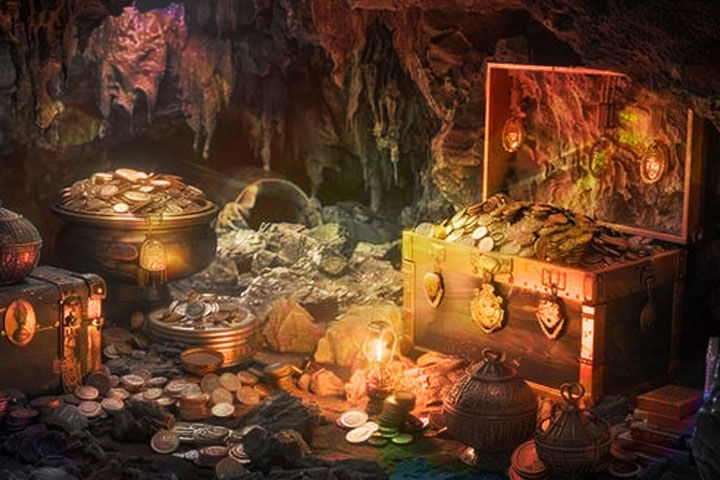Trauma Healing Sucks | Here’s the Treasure I Found
- Michael C Walker

- Feb 22
- 3 min read
Updated: Mar 26
Complex Trauma (C-PTSD) traps you in cycles of despair via state-dependent memory and repetition compulsion. Beneath the pain lies hidden gold, a future you, uncovered by facing the Malignant Complex in isolation. This guide blends Jungian insight, neuroscience, and spiritual wisdom to transform trauma into triumph.

I know what vengeance feels like.
“For where your treasure is, there will your heart be also.” —Matthew 19:21
Complex Trauma (C-PTSD) deformed my life, carved a tortured personality. Remembering my childhood wounds felt outrageous, forbidden. It was like I was an outlaw breaking some unspoken law. I dared anyway. My revolt was my proof: answers existed. I was an indictment against those who’d silently tormented me, who’d complicitly fueled the machines that shipwrecked me with religion, broken families, hollow jobs. I was exiled, but I wasn’t done.
The Siren’s Endless Loop
In the beginning, trauma is a journey you travel alone. Trauma drags you back—day after day, year after year, through every shattered bond. It’s not you; it’s a siren luring you to rocks of despair. Psychologists call it repetition compulsion. I isolated myself, trapped in the same cycle I’d lived as a kid. My unresolved pain pulled me under, crashing against tormenting waves of emotion. State-dependent memory chained me there- The anguish of rejection flooding back, driving me to retreat. I sank deeper, desperate to fix it, blind to the pattern. Therapy? Drugs and alcohol? They skimmed the surface. The real specter stayed hidden, cold and indifferent.
The Cave of Hidden Gold
Your trauma isn’t you. It’s a specter concealing what could be, a memory of the future you, buried on an island of loneliness…hopelessness. I offer no comfort, only a shove deeper into the dark. State-dependent memory hides your gold that trauma locked in the fear or the rage where it was born. You’ve got to enter the cave of isolation to find it. I did.
It uses your dissociation against you, cloaking itself in plain sight.
The hardest part? Spotting that specter. It’s a Malignant Complex, a cancer twisting your mind, whispering you exist because of it. It uses your dissociation against you, cloaking itself in plain sight. I learned to hear its lies, the way it mimicked my voice, convinced me I’d never heal. But I sat still in that secret cave, the damp smell of soaked wood and shivering exposure from torn clothes biting at me. I lit a fire. I saw the truth: my trauma wasn’t my fate. There’s a way to redeem that lost gold, to rewrite the memory of who you’ll become. I found it—not in books or platitudes, but in the outlaw questions I dared to ask. The treasure’s real. I won’t hand it over yet... you’ve got to want to convert your fateful trauma into destiny.
The Monte Cristo Triumph
Go deeper anyway. Go alone, into that state-dependent darkness. Sit quietly in the cave. Calm yourself enough to spark a flame, and you’ll see: this isn’t a hopeless tale. It’s a beautiful narrative. Your trauma, your vengeance, it’s The Count of Monte Cristo. I’ve walked this exile, faced the specter, unearthed the gold. The story’s yours to claim. Vengeance doesn’t have to be a curse; it can forge a path. I’ve seen the future you, and it’s not oblivion—it’s triumph.
Chase the Fire With Me
You’re not alone. I’ve mapped this island. I know the Malignant Complex’s tricks, the sound of its deceit. I’ve found the way to lost memory, the possibility of a future you without trauma. Want it? I’ll show you the way, not with empty promises, but with the fire I lit. Chase the treasure. Ask your outlaw questions. Visit jaguarmarigold.com and step into the cave with me.
About the Author
Michael C Walker, a chaplain at Jaguar Marigold Chapel, combines Christian Mysticism, Depth Psychology, Affective Neuroscience, Classical Studies, and Dream Mapping to delve into the human psyche. With 20+ years of experience, he pioneers the fusion of spiritual wisdom and scientific exploration. His innovative approach to Complex Trauma (C-PTSD) provides insights for Self-Analysis, divine purpose, and authenticity.






Comentários